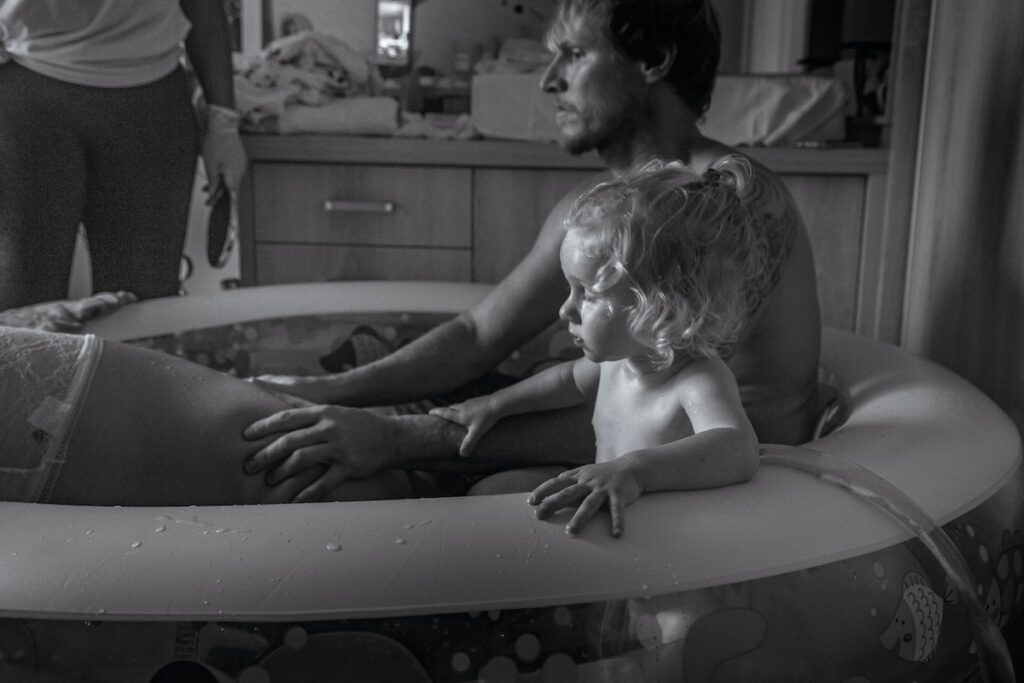Preparing for the arrival of a new baby can be an exciting and overwhelming experience. A birth checklist is something you need at hand a month prior to delivery. From creating a birth plan to attending childbirth classes, there are many things to consider before and after your baby’s arrival.
Just as the pregnancy checklist prepared you for pregnancy, this birth checklist is curated to help ensure you’re not forgetting any important steps, pre-birth and post-birth and to ultimately help make the transition smoother.
1. Birth Plan
A birth plan is a document that outlines your preferences for labor and delivery and it can help ensure that your wishes are considered during labor and delivery.
Discussing Birth Options and Preferences with Your Partner
It’s important to discuss your birth options and preferences with your partner or support person to ensure that your wishes are considered during labour and delivery. You may want to consider factors such as pain management, labor and delivery positions, and who will be present during the birth.
Creating a Birth Plan
Once you have discussed your options and preferences with your healthcare provider, you can create a birth plan that outlines your wishes. Your birth plan may include information such as:
- Your preferred pain management methods,
- Any special requests for the birth environment, and
- Your preferred person to be present with during labor and delivery.
Communicating Your Birth Plan with Your Healthcare Provider
It’s important to communicate your birth plan with your healthcare provider early in your pregnancy. This allows them to understand your wishes and make any necessary arrangements. You may want to bring a copy of your birth plan to appointments and discuss it with your provider to ensure everyone is on the same page.
Remember that your birth plan is not set in stone and may need to be adjusted based on medical needs or unforeseen circumstances. However, having a birth plan can help you feel more prepared and empowered during labor and delivery.
2. Childbirth Classes
These classes are designed to prepare expectant parents for labor and delivery.
Benefits of Childbirth Classes
Childbirth classes can provide a variety of benefits for expectant parents, including:
- Education about the stages of labor and delivery, as well as pain management options and coping techniques
- Information about newborn care and breastfeeding
- The opportunity to meet other expectant parents and share experiences
- Increased confidence and reduced anxiety about labor and delivery
Types of Childbirth Classes

There are several types of childbirth classes available, including
- Hospital-based classes: These classes are typically held at the hospital where you plan to deliver and may be taught by a nurse or childbirth educator.
- Private classes: Private classes may be taught by a childbirth educator or doula and can be customized to meet your specific needs and preferences.
- Online classes: Online childbirth classes are convenient for expectant parents who cannot attend in-person classes.
Childbirth classes typically cover a range of topics, including:
- The stages of labour and delivery
- Pain management options, including medication and natural techniques
- Breathing and relaxation techniques
- The role of the birth partner
- Newborn care and breastfeeding
Classes may include hands-on activities, such as practising breathing techniques or labor positions, and opportunities to ask questions and share experiences with other expectant parents.
Childbirth classes can provide valuable education and support for expectant parents, and there are several different types of classes to choose from. Expect to learn about the stages of labor, pain management options, breathing and relaxation techniques, newborn care, and breastfeeding, as well as to participate in hands-on activities and discussions with other expectant parents.
3. Hospital/Birth Center Preparation
Preparing for the birth of your baby involves more than just creating a birth plan. Hospital/birth center preparation involves touring the facility, packing your hospital bag, and knowing what to expect during labor and delivery.
Touring the Hospital/Birth Center
Touring the hospital or birth centre where you plan to deliver your baby can help you feel more prepared and less anxious. During the tour, you can expect to:
- Get familiar with the labor and delivery rooms, as well as postpartum recovery rooms
- Meet the nursing staff and ask questions about their experience and qualifications
- Learn about the hospital or birth center’s policies and procedures
Hospital Bag Packing
Packing your hospital bag well in advance of your due date can help you feel more prepared and less stressed. Here are some items you may want to include:
- Comfortable clothing for labor and delivery
- Toiletries, such as a toothbrush and deodorant
- Snacks and drinks for you and your birth partner
- Entertainment, such as books or a tablet
- A going-home outfit for you and the baby
By familiarizing yourself with the facility, packing all the necessary items in advance, and understanding what will happen during labor and delivery, you can feel more confident and prepared for the big day.
4. Labor and Delivery Essentials
Labor and delivery can be an intense and emotional experience, but being prepared can help ease some of the anxiety. Knowing what to expect during labor and delivery can help you feel more prepared and less anxious. Here are some things you can expect:
- Contractions will become stronger, longer, and closer together
- You will likely need to stay at the hospital or birth center for some time after delivery
- You may experience pain during labor, but there are many pain management options available
- The baby will be monitored throughout labor and delivery to ensure their safety
Understanding the Stages of Labor

Labor is divided into three stages:
Stage 1: Early labor, active labor, and transition
Stage 2: Pushing and delivery of the baby
Stage 3: Delivery of the placenta
During each stage, your body will undergo changes to prepare for delivery. Knowing what to expect can help you feel more in control and prepared for the process.
Pain Management Options
Some of the many pain management options available during labor and delivery include
- Breathing techniques and relaxation exercises
- Epidurals and spinal blocks
- Nitrous oxide (laughing gas)
- Narcotic pain relievers
Discuss your options with your healthcare provider and create a plan that aligns with your birth preferences.
Preparing for Vaginal or Cesarean Delivery
It’s important to prepare for both vaginal and cesarean delivery, even if you prefer one over the other. Here are some things you can do to prepare:
- Pack a hospital bag that includes items for both scenarios
- Discuss your birth preferences with your healthcare provider
- Learn about the signs of labor and when to call your healthcare provider
- Attend childbirth classes to learn about labor and delivery
Preparing for vaginal and cesarean delivery can help you feel more confident and prepared for the big day. Talk to your healthcare provider, attend childbirth classes, and pack a hospital bag that includes items for both scenarios to ensure you are fully prepared.
5. Baby Gear and Supplies
Welcoming a new baby into the world can be an exciting and overwhelming experience. As a new parent, you want to ensure you have all the essentials for your little one. Here are some tips to help you prepare:
The Essentials You’ll Need for your baby
- Diapers (cloth or disposable)
- Wipes
- Diaper cream
- Onesies
- Sleepsuits
- Swaddles
- Hats
- Socks/booties
- Blankets
- Burp cloths
- Breastfeeding supplies (if applicable)
- Bottles and formula (if applicable)
- Car seat
- Stroller
- Baby carrier/sling
Tips for choosing the right baby gear
- Look for high-quality products that meet safety standards.
- Consider the size of your home and lifestyle when choosing baby gear.
- Read reviews and ask for recommendations from other parents.
- Don’t be swayed by trends or fads – choose items that will be practical and useful for your baby.
Understanding what you really need and what you don’t
- Avoid overbuying and stick to the essentials.
- Some items, like a changing table or baby bathtub, may not be necessary and can take up valuable space in your home.
- Remember that babies grow quickly, so don’t buy too many clothes or shoes in the same size.
By preparing the right gear and supplies for your baby, you can feel more confident and prepared for your new role as a parent.
6. Newborn Care Basics
Caring for a newborn can be a challenging experience, especially for first-time parents. Here are some basics to help you get started:
Understanding newborn care
- Newborns need frequent feedings (every 2-3 hours)
- They sleep a lot (up to 17 hours a day)
- They need to be kept warm (dress them in layers and keep the room temperature at around 68-72°F)
- They may have a variety of reflexes, such as rooting and sucking, that are important for feeding.
Tips for bathing, diapering, and feeding your newborn

Bathing:
- Only give your newborn a sponge bath until the umbilical cord stump falls off.
- Use mild soap and avoid getting water in their ears, nose, and eyes.
Diapering
- Change your baby’s diaper frequently, at least every 2-3 hours
- Use diaper cream to prevent diaper rash.
Feeding
- Newborns need to be fed frequently, either through breastfeeding or formula.
- Watch for hunger cues like sucking on hands or smacking lips.
- Try to feed before your baby starts crying.
Preparing for your baby’s first doctor’s appointment
- Schedule your baby’s first doctor’s appointment within a week of coming home from the hospital.
- Make a list of any questions or concerns you have for the doctor.
- Bring your baby’s health records and any medications they are taking.
By understanding the basics of newborn care, you can feel more confident in caring for your new baby. Remember to ask for help if you need it, and take care of yourself.
7. Breastfeeding/Feeding Plan
As a new parent, one of the most important decisions you will make is how to feed your baby. Breastfeeding is a popular option for many new mothers, and for a good reason. It provides many benefits for both the baby and the mother.
The Benefits of Breastfeeding
Breast milk is the perfect food for newborns. It contains all the necessary nutrients and antibodies to help your baby grow and develop. Breastfeeding has been linked to lower Sudden Infant Death Syndrome (SIDS) rates, childhood obesity, and certain infections.
Breastfeeding also has benefits for the mother. It can help with postpartum weight loss, reduce the risk of breast and ovarian cancer, and promote bonding with your baby.
Preparing for Breastfeeding
If you plan to breastfeed, preparing ahead of time is important. Talk to your healthcare provider about any concerns you may have and attend a breastfeeding class or support group. You’ll also want to invest in a comfortable nursing bra and nursing pads.
Understanding Formula Feeding Options
Studies suggest that formula milk is a good nutritional option when breast milk is insufficient or unavailable.
Many different types of formula are available, including cow’s milk-based, soy-based, and hypoallergenic formulas. Talk to your healthcare provider about which type of formula is right for your baby.
Remember, the most important thing is to feed your baby in a comfortable way for both you and your baby. With some preparation, breastfeeding and formula feeding can be easy and rewarding experiences for you and your baby.
8. Postpartum Recovery
After giving birth, your body goes through many changes, and it’s important to give yourself time to heal and recover. Here are some tips to help you take care of yourself during the postpartum period:
Understanding postpartum recovery
The postpartum period refers to the time after childbirth when your body goes through physical and emotional changes as it heals and adjusts to the demands of caring for a newborn. It can last several weeks or months, depending on your circumstances.
Caring for your body after delivery
You may experience bleeding, soreness, and fatigue during the first few weeks after delivery. Getting plenty of rest, eating a healthy diet, and staying hydrated is important. You may also need to take pain medication or use ice packs to relieve discomfort.
Preparing for your first postpartum checkup
Your healthcare provider will likely schedule a postpartum checkup within a few weeks of your delivery. This is a good time to discuss any concerns and receive guidance on topics such as birth control and resuming sexual activity.
Remember that postpartum recovery is different for every woman, and it’s important to listen to your body and seek help if needed. Don’t hesitate to contact your healthcare provider if you have any questions or concerns.
9. Emotional Well-Being During Childbirth & Post Delivery
Pregnancy and childbirth can be both exciting and overwhelming experiences hence it is one of the must-have things on our birth checklist. It is normal to feel a wide range of emotions during this time. However, it’s important to pay attention to your emotional well-being and care for yourself as much as possible.
Understanding postpartum depression and anxiety
Postpartum depression and anxiety are common emotional health issues that can occur after childbirth. Watch out for postpartum depression, which can include: feelings of sadness, hopelessness, and guilt. symptoms of anxiety can include excessive worry, restlessness, and trouble sleeping.
Talking to your healthcare provider if you experience these symptoms is important.
If you or your partner is experiencing symptoms of postpartum depression or anxiety, seeking help is important.
Postpartum Support and Care
As a new parent, it’s essential to understand the importance of postpartum support and care. After giving birth, you’ll need time to heal and adjust to your new role as a parent. A support system can make all the difference in your postpartum recovery and overall well-being.
One of the first steps to creating a postpartum support network is to:
- Identify the people in your life who can offer help and support. This could include your partner, family, friends, or even a postpartum doula. Reach out to these individuals before your baby arrives and let them know what kind of support you may need.
- Postpartum doulas are professionals who support new parents during the postpartum period. They can provide emotional support, help with newborn care, and offer guidance on breastfeeding and postpartum recovery. If you’re interested in hiring a postpartum doula, do your research and find someone certified and experienced.
- In addition to professional support, joining a new parent support group or attending a new parent class can be a great way to connect with other parents going through similar experiences. These groups can offer a sense of community and provide a safe space to ask questions and share advice.
Final words
Remember, it’s okay to ask for help and accept support. Caring for a newborn can be challenging, and having a support system can make all the difference. With the right support and care, you can navigate the challenges of pre-birth and postpartum and enjoy your new role as a parent.

In conclusion, taking care of your emotional well-being during pregnancy and childbirth is just as important as taking care of your physical health. Don’t be afraid to contact your loved ones or seek professional help if you struggle with postpartum recovery or emotional health.












